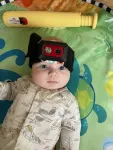(Press-News.org) Professor Manolya Kavakli is an expert in gamification
Her talk will examine the complex relationship between humans, computers and tech
She will examine how digital developments have the potential to improve lives and modernise industry.
The latest inaugural lecture at Aston University will look at the complex relationship between humans, computers and technology.
Professor Manolya Kavakli will discuss progress so far and offer insights into how to ease into digital transformation for the challenges that lie ahead.
The professor is an expert in gamification, the process of using elements of gaming in non-gaming situations such as learning and training.
She joined the University’s multi-disciplinary Aston Digital Futures Institute in mid-September 2023. Her lecture will help the research centre achieve one of its six aims - to shape and lead the public debate around what society’s digital future might look like and influence socially responsible transformations and sustainable growth.
In her talk she will explore the recent digital transformations society has undergone and how they have the unrivalled potential to improve lives and modernise industry, government and public services. She will also discuss the significance of human information processing in the development of AI applications.
Professor Kavakli said: “Over the past decades, we have seen rapid technological advances in artificial intelligence and mixed reality which has gained pace most notably after the introduction of generative AI.
“Social media websites use machine learning algorithms to produce content specifically tailored for users; businesses utilise gamification and data analytics to sell products to their customers; doctors incorporate AI to examine medical images in search of cancer; robotic arms and legs support amputees; and brain computer interfaces combine man and machine systems to support human activities.
“Analysing human motions and information processing, we can evaluate the ways to improve the joint performance of man and machine systems. My lecture will provide a review of developments as well as our digital past for establishing digital futures by giving examples of pioneering interfaces we have developed.”
The professor originally started her career in architecture and until 1999 she was an associate professor at the faculty of architecture at Istanbul Technical University, developing AI applications in design.
In 2000 she moved fully into IT and became the acting course coordinator of the Bachelor of Computer Science (games technology) degree at Charles Sturt University, which was the first of its kind in Australia.
Later she moved to Macquarie University in Sydney, Australia where she served as the founding director of the pioneering research facilities, the virtual reality lab and the simulation hub between 2003 and 2020, and the director of postgraduate programmes, department of computing, between 2014 and 2018.
She received three Research Professorships in France from ENSAM (2013 to 2014) and AIX Marseille (2018) to work on Virtual and Augmented reality applications.
She was the founding academic director of Australia’s AIE Institute between 2019 and 2023 and designed a bachelor of game development degree with three majors: game art, game design and game programming. She is also the founding member of VISOR (Virtual and Interactive Simulations of Reality Research Group), and CEPET (Research Centre for Elite Performance, Expertise and Training).
The free event will take place on the University campus at the Susan Cadbury Lecture Theatre, B4 7ET on Wednesday 29 May from 6pm to 7.30pm and will be followed by a drinks reception. The event can also be viewed online.
To sign up for a place in person visit:
https://www.eventbrite.co.uk/e/an-inaugural-lecture-professor-manolya-kavakli-tickets-764392166547?aff=oddtdtcreator
To sign up for a place online visit:
https://www.eventbrite.co.uk/e/an-inaugural-lecture-professor-manolya-kavakli-online-tickets-764392427327?aff=oddtdtcreator&_gl=1*osncux*_up*MQ..*_ga*MzA4MTY4MTE5LjE3MTUwNzExODI.*_ga_TQVES5V6SH*MTcxNTA3MTE4Mi4xLjAuMTcxNTA3MTE4Mi4wLjAuMA..
END
A retrospective look at Human Computer Interaction - free public lecture by Professor Manolya Kavakli
2024-05-10
ELSE PRESS RELEASES FROM THIS DATE:
Reducing prejudice in war zones proves challenging
2024-05-10
There are 62.5 million internally displaced persons worldwide, according to 2022 data by the UNHCR, the United Nations Refugee Agency. These individuals were forced to leave their homes but remain in the same country.
Prior research has shown that internally displaced persons often experience prejudice and discrimination, as residents in their new locale fear that the migrants may be insurgents or criminals, or compete for jobs.
Now, a new Dartmouth study involving Afghanistan indicates that changing such attitudes is an uphill battle. Given the decades of fighting there, Afghanistan has had one of the largest populations ...
Chapman professor contributes to breakthrough hemostasis and wound healing research
2024-05-10
A breakthrough study, published in Science Translational Medicine, features a biomedical engineering innovation with the potential to transform trauma care and surgical practices. Chapman University’s Fowler School of Engineering Founding Dean and Professor, Andrew Lyon, is a member of this multidisciplinary, multi-university scientific research team developing platelet-like particles that integrate into the body’s clotting pathways to stop hemorrhage. Sanika Pandit, an alumna of Chapman University, is also among the 15 authors in this research.
Addressing a longstanding gap in surgical and trauma care, this advancement holds potential for patient implementation. Patients ...
Melanoma in darker skin tones: Race and sex play a role, Mayo study finds
2024-05-10
ROCHESTER, Minn. — Melanoma, an aggressive form of skin cancer that accounts for 75% of all skin-cancer-related deaths, is often detected later in people with darker skin complexions — and the consequences can be devastating, a Mayo Clinic study reveals.
While melanoma may be found less frequently in people with darker complexions than fair ones, this potentially serious form of cancer can strike anyone. The study, which consisted of 492,597 patients with melanoma, suggests that added vigilance in early screening is particularly needed for Black men, whose cancers ...
Visual experiences unique to early infancy provide building blocks of human vision, IU study finds
2024-05-10
What do infants see? What do they look at? The answers to these questions are very different for the youngest babies than they are for older infants, children and adults. Characterized by a few high-contrast edges in simple patterns, these early scenes also contain the very materials needed to build a strong foundation for human vision.
That is the finding of a new study, “An edge-simplicity bias in the visual input to young infants,” published on May 10 in Science Advances by IU researchers Erin Anderson, Rowan Candy, Jason Gold and Linda Smith.
“The starting ...
Clues from deep magma reservoirs could improve volcanic eruption forecasts
2024-05-10
New research into molten rock 20km below the Earth’s surface could help save lives by improving the prediction of volcanic activity.
Volcanic eruptions pose significant hazards, with devastating impacts on both people living nearby and the environment.
They are currently predicted based on activity of the volcano itself and the upper few kilometres of crust beneath it, which contains molten rock potentially ready to erupt.
However, new research highlights the importance of searching for ...
Scientists unlock key to breeding ‘carbon gobbling’ plants with a major appetite
2024-05-10
The discovery of how a critical enzyme “hidden in nature’s blueprint” works sheds new light on how cells control key processes in carbon fixation, a process fundamental for life on Earth.
The discovery, made by scientists from The Australian National University (ANU) and the University of Newcastle (UoN), could help engineer climate resilient crops capable of sucking carbon dioxide from the atmosphere more efficiently, helping to produce more food in the process.
The research, published in Science Advances, demonstrates a previously unknown function of an enzyme called carboxysomal carbonic anhydrase (CsoSCA), which is found in cyanobacteria – also called ...
Hubble celebrates the 15th anniversary of servicing Mission 4
2024-05-10
Fifteen years ago, human hands touched NASA's Hubble Space Telescope for the last time.
As astronauts performed finishing tasks on the telescope during its final servicing mission in May 2009, they knew they had successfully concluded one of the most challenging and ambitious series of spacewalks ever conducted. But they couldn’t have known at the time what an impact they had truly made.
“I had high hopes that Hubble would last at least five years more, and maybe even a little more to overlap with Webb,” said astronaut and former associate administrator for NASA's Science Mission Directorate John ...
Hints of a possible atmosphere around a rocky exoplanet
2024-05-10
55 Cancri e is one of five known planets orbiting a Sun-like star in the constellation Cancer. With a diameter nearly twice that of Earth and a density slightly greater, the planet is classified as a super-Earth: larger than Earth, smaller than Neptune, and similar in composition to the rocky planets in our solar system.
Brice-Olivier Demory from the Center for Space and Habitability CSH of the University of Bern and member of the NCCR PlanetS is co-author of the study that has just been published in Nature. He ...
UVA Data Art Competition draws more than 130 submissions and announces winners
2024-05-10
Data has the power to tell captivating stories and reveal hidden insights, often in aesthetically compelling ways.
In celebration of this, the University of Virginia’s School of Data Science hosted an art competition to commemorate the opening of its new building and to invite participants from all over the world to tell unique stories by transforming raw data into art. The School received more than 130 submissions from nine countries, far exceeding expectations for an inaugural competition.
After selecting eight finalists from a wide range of artistic formats, the winners were announced during ...
Why so many jobs are boring: New MSU study identifies large interest gaps in US labor market
2024-05-10
MSU has a satellite uplink/LTN TV studio and Comrex line for radio interviews upon request.
EAST LANSING, Mich. – A recent study out of Michigan State University found large gaps between people’s career interests and U.S. job demands. These gaps indicate that the interest demands of the U.S. labor market differ drastically from the supply of interested people, revealing how many people have unfulfilled interests at work.
The study, published in the Journal of Business and Psychology, is the first to look at labor gaps using career ...



